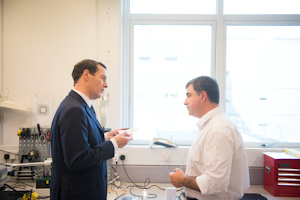Sep 12 2014
Funding provided by the UK Research Partnership Investment Fund, the Technology Strategy Board and Masdar, an Abu Dhabi-based clean technology and renewable energy company
 Sir Kostya showing George Osborne the graphene labs
Sir Kostya showing George Osborne the graphene labs
The University of Manchester is to build a £60m Graphene Engineering Innovation Centre (GEIC). The facility will be critical in the development of commercial applications and in maintaining the UK’s world-leading position in graphene and related 2-D materials.
The GEIC will be partially funded by £15m from the Higher Education Funding Council for England’s UK Research Partnership Investment Fund (UKRPIF), £5m from the Technology Strategy Board and by £30m from Masdar, the Abu Dhabi-based renewable energy company owned by Mubadala which focuses on advancing the development, commercialisation and deployment of clean technologies and solutions. Additional funding for the Centre and its programmes will be provided by other research funds and institutions. The Centre will allow for the acceleration of applied research and development in partnership with other research organisations and industry.
In addition, The University of Manchester and Masdar Institute, the research-intensive university that is a key pillar of the Masdar Initiative, have commenced identifying joint graphene application research and fellowship programmes, which will focus on industrial applications for graphene across a range of sectors.
The GEIC will complement Manchester’s existing National Graphene Institute (NGI), where over 200 scientists and engineers are dedicated to graphene and 2-D materials research. Together, the two facilities will reinforce Manchester’s position as a globally leading knowledge base in graphene research and commercialisation.
Vice-President and Dean of the Faculty of Engineering and Physical Sciences, Professor Colin Bailey, said: “Research and development in graphene and 2-D material applications will transform the world. The world-leading knowledge base is here in Manchester and to harvest this knowledge, for the benefit of the economy and society more widely, urgent infrastructure facilities are required. The GEIC, supported by part funding from the UKRPIF, TSB and Masdar, is essential to maintain the UK’s international leadership position in this area and ensure effective commercialisation of a UK discovery.”
The Chief Executive Officer of Masdar, Dr. Ahmad Belhoul, said: "Developing and implementing new sustainable technologies is at the heart of Masdar’s mission. Our existing research partnerships have a history of producing innovative solutions across a range of sectors. Masdar is pleased to be partnering with The University of Manchester, which has world leading academic and research credentials. With potential applications for graphene across major industries, we are confident that together we can pioneer the use of this ground breaking material."
The GEIC will fill a critical gap in the ecosystem for graphene and 2-D material research, development, and application in the UK. It will offer the UK the unique opportunity to establish a leading role in a disruptive technology that spans a number of industrial sectors. Linking into existing national expertise, the GEIC will focus on pilot production and characterisation, together with application development in composites, energy, solution formulations and coatings, electronics, and membranes.
The GEIC facility will also stimulate the commercial redevelopment of the University’s North Campus, creating a cornerstone for ‘graphene city’ and a wider advanced materials campus. The campus is located just yards from HS2 at Piccadilly Station and the proposed HS3 link across the north, recently announced by the Chancellor.